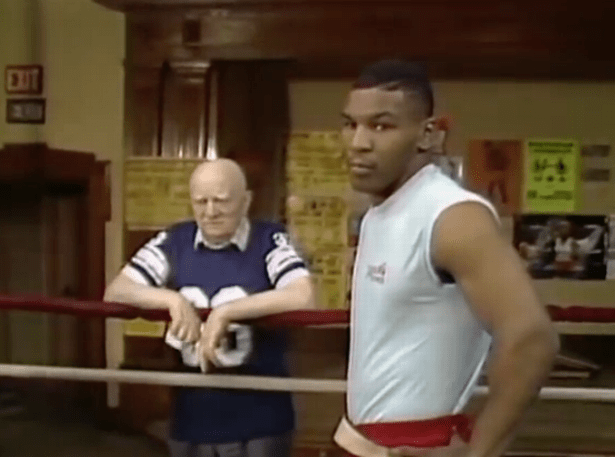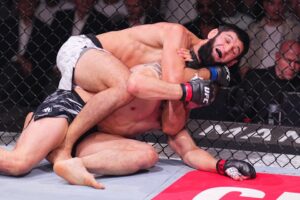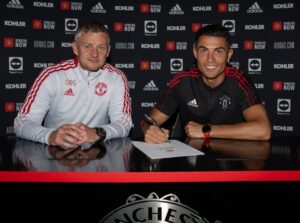Mike Tyson shared a special bond with his early trainer and mentor, Cus D’Amato.
There was one life-changing exchange between the pair which transformed him into ‘Iron Mike’ and a ‘savage’ in the boxing ring.
D’Amato honed the young Tyson into a heavyweight destroyer
The 13-year-old Tyson was a petty thief in a detention centre when he was discovered by ex-boxer Bobby Stewart, who recognised his raw potential and introduced him to D’Amato.
The Italian-American became Tyson’s trainer, brought him into his home and was his legal guardian by the time of his death in 1985.
But while Cus poured his boxing knowledge into Tyson and built his confidence, he was also hyper-critical of his protégé – and one of these moments led Tyson to finding the ferocious attitude that he’d carry into the ring as a professional.
Tyson was short for a heavyweight – listed at an optimistic 5ft 11in during his career – and was overweight as a teenager.
As Tyson recalls in his autobiography, ‘Undisputed Truth’, D’Amato once told him out of the blue: “Man, I wish you had a body like Mike Weaver or Ken Norton, because then you would be real intimidating. You’d have an ominous aura. They don’t have the temperament but they have the physique of an intimidating man. You could paralyse the other boxers with fear just by the way you look.”
The fighter admits he got ‘choked up’ at the harsh comparison to two muscular heavyweights but hid his emotions and became determined to build an intimidating presence all of his own.
Tyson responded: “Don’t worry Cus… You watch. One day the whole world is going to be afraid of me. When they mention my name, they’ll sweat blood, Cus.”
And he wrote: “That was the day I turned into Iron Mike; I became that guy 100 per cent.
“Even though I had been winning almost every one of my fights in an exciting fashion, I wasn’t completely emotionally invested in being the savage that Cus wanted me to be.
“After that talk of being too small, I became that savage.”
D’Amato welcomed Tyson to live with him and his family
He had trained many fighters before meeting TysonGetty
‘Iron Mike’ was one of the most intimidating fighters of all timeGetty Images – Getty
It’s eye-opening that any trainer could question Tyson’s ‘ominous aura’ – as he became the most feared fighter of his generation – but D’Amato’s tough love clearly had the desired impact.
To this day, Tyson feels a deep loyalty and a debt of gratitude to his first real father figure. But the pair had a complex dynamic.
Tyson understood that Cus’s devotion to him was purely because of what he could become as a boxer.
As he once put it: “If I failed, Cus would get rid of me” – and Tyson once described their relationship as like a soldier and his general.
But D’Amato was also the first person to tell Tyson, who came from an incredibly tough upbringing in Brooklyn, that he could make something of himself.
The first time he watched the 13-year-old spar three rounds, Cus told him directly that he would become the youngest heavyweight champion in the world – an astonishing prediction that came true in 1986, a year after the trainer’s death.
D’Amato sadly died before he could see Tyson become champion
D’Amato was an uncompromising figure who stood up to the mob influence in boxing. But he was, as even Tyson admits, a bitter individual who didn’t have ‘a happy muscle in his face’.
The trainer had coached Floyd Patterson – a fast, gifted but vulnerable boxer – to the heavyweight crown in the 1950s.
He kept his fighter away from no.1 contender Sonny Liston, in part because of Liston’s links to organised crime. But when the two boxers eventually met Liston bludgeoned Patterson to defeat in one round.
The peek-a-boo style D’Amato taught – with gloves held high and an emphasis on slipping punches with side-to-side movement – was criticised and the trainer was cut adrift from elite boxing by the 1980s.
But when he discovered Tyson, Cus realised he had found the perfect fighter for his style: a short but stockier heavyweight than Patterson with explosive power and superior punch resistance.
The pair were a perfect match: D’Amato, who wanted to wreak revenge on the boxing world, and Tyson, the troubled teen in urgent need of a purpose.
The only issue was that D’Amato was in his 70s by the time they met and knew time was against him.
At various points D’Amato would claim that boxing was 50, 70 even 90 per cent psychological.
So as well as honing Tyson’s skills every day, the trainer would also work on his mentality – building Tyson’s confidence and nurturing his arrogance by telling him he was unstoppable, but also being his toughest critic.
Tyson’s reputation in the ring earned him the nickname ‘Iron Mike’ and the ‘Baddest Man on the Planet’Getty Images – Getty
When Tyson was asked in a TV interview long after his retirement whether he feared or loved D’Amato, he answered simply: “Both.”
“I was petrified when I was alone with him,” Tyson said in his 2017 book ‘Iron Ambition: My Life with Cus D’Amato’. “People see the public celebrations of my sensational knockouts but they don’t hear Cus talking to me alone after the fight…
“They were never around when Cus made me feel two inches tall, when he asked me: ‘Am I wasting my time with you? I’m an old man. you’re a phoney.’”
But Tyson also referred to D’Amato as his ‘backbone’ and missed him intensely after he died when Mike was an 11-0 heavyweight prospect.
“He gave me a purpose,” Tyson said in 1986. “I never had that feeling in my life before.”
One often-asked question is what Tyson could have become had D’Amato lived longer? The romantic notion being that he might have avoided the clutches of Don King and the career decline that began as early as age 23 with his shock loss to James ‘Buster’ Douglas.
D’Amato’s impact on Tyson changed the course of heavyweight boxing historyGetty
Certainly the path of his career would have been different had Cus lived another decade. But even he struggled to contain Tyson’s wild side with the heavyweight admitting: “I’d be up in Catskill [at D’Amato’s home] and be the choirboy and then I’d go down to Brooklyn and be the devil.”
If the trainer was struggling to keep Tyson from temptation when he was young and impressionable, it is a stretch to imagine that he’d have done so when Tyson became rich, famous and successful. But it’s also true that Tyson lost direction fast without Cus’ influence.
Tyson spectacularly blasting out Trevor Berbick in 1986 was just the start of his heavyweight reign of terror. But in Mike’s mind it was the beginning of the end: he had accomplished the mission his guru had set out for him and become the youngest champion in history – but where next?
“I was lost,” Tyson later reflected. “By the time I won the belt I was truly a wrecked soul because I didn’t have any guidance. I didn’t have Cus.”
Tyson has seemingly found peace in later life, but will still be returning to the ring to take on Jake Paul on November 15.



